Mobile Menu

Lauryn Seering
FFRF blasts Supreme Court’s Trinity Lutheran decision
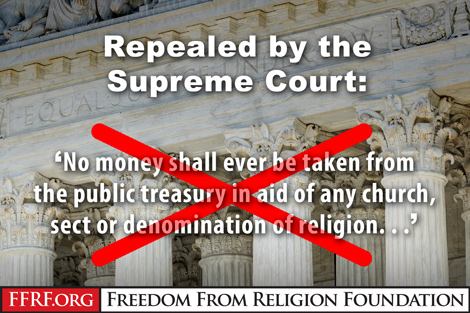
The U.S. Supreme Court issued a decision today that could inflict incalculable damage upon the constitutional wall of separation between state and church. Seven justices turned their backs on the hallowed principle that citizens should not be forced to financially support churches and church schools.
In a 7-2 vote, the court, in a decision by Chief Justice John Roberts, ruled in favor of Trinity Lutheran Church of Columbia, Mo., in its court battle against the state of Missouri. The church, which runs a religiously segregated day care, sued because it was excluded from a program that provides grants to nonprofits to resurface playgrounds with recycled tires. Missouri's Constitution, along with more than 30 other state constitutions, bars direct or indirect taxpayer funding "in aid of any church, sect, or denomination of religion."
The decision strikes a blow, possibly fatal, against treasured provisions in a majority of state constitutions whose prohibitions against taxpayer support of religion are more explicit than the First Amendment's Establishment Clause.
It has been a bright line rule since America's founding that the government will not fund religion or the free exercise of religion. Today, the Supreme Court destroyed that rule, claiming that a government funding program that is not open to churches "violates the Free Exercise Clause." This turns the steadfast rule on its head, admitting that government funds that flow to churches ultimately facilitate religious worship. Never in our history has the government been able to fund religious worship- until now.
On its face, the outcome seems benign: A church school can write a grant to replace asphalt or other pavement at a playground with retreaded rubber tires to make it safer. But in fact, the church school receiving this public improvement is free to proselytize the tots under its protection, and to discriminate in admission in favor of only Lutheran or Christian children, or any other criteria it cares as a private entity to adopt.
It's no surprise that President Trump's new appointee, Neil Gorsuch, joined Roberts and Justices Samuel Alito, Clarence Thomas, Anthony Kennedy, Stephen Breyer and Elena Kagan in siding with the majority. (What is more surprising is the extent to which Gorsuch agreed with Thomas in a concurring opinion.)
"The exclusion of Trinity Lutheran from a public benefit for which it is otherwise qualified, solely because it is a church, is odious to our Constitution all the same, and cannot stand," the decision reads.
Justice Sonia Sotomayor wrote the well-argued dissent, joined by Justice Ruth Bader Ginsburg.
"To hear the court tell it, this is a simple case about recycling tires to resurface a playground," she stated. "The stakes are higher. The case is about nothing less than the relationship between religious institutions and the civil government — that is, between church and state. The court today profoundly changes that relationship by holding, for the first time, that the Constitution requires the government to provide public funds directly to a church. Its decision slights both our precedents and our history, and its reasoning weakens this country's longstanding commitment to a separation of church and state beneficial to both."
The Freedom From Religion Foundation was part of an amicus brief against Trinity Lutheran, which pointed out that direct grants to churches clearly violate the Establishment Clause, making the state prohibitions constitutional.
This case shames the high court in another way: It should never have been decided. The state of Missouri, a week before the April oral arguments, changed its policy and permitted churches to compete for the grants, mooting the case. The court would kick most cases to the curb where the parties agree, but here, the majority simply passed over this in a footnote. Clearly, a majority on the ultra-conservative court was keen on using this opportunity to eviscerate many state provisions predicated on Thomas Jefferson's original Virginia Statute for Religious Liberty.
The heart of the Jefferson statute guarantees that no citizen may be forced to pay taxes that are used to erect, attend or support any place of worship.
Some 33 state constitutions have language, often referred to as the Blaine Amendment, that contain strong guarantees against public support of religion. Article 1, Section 7 reads: "That no money shall ever be taken from the public treasury, directly or indirectly, in aid of any church, sect or denomination of religion, or in aid of any priest, preacher, minister or teacher thereof, as such; and that no preference shall be given to nor any discrimination made against any church, sect or creed of religion, or any form of religious faith or worship."
James Madison, the father of the First Amendment, opposed even a three-penny tax to benefit churches. Unfortunately, a decision approving what may appear at first blush to be a minor usage of tax dollars may open the floodgates. Today's decision guts Jefferson's and Madison's wise counsel against forcing taxpayers to spend even "threepence" in support of religion. We will all suffer the consequences.
FFRF insists on cross removal from Tex. sheriff’s office
 The Freedom From Religion Foundation is demanding that a prominently exhibited cross be taken down from a Texas sheriff's office.
The Freedom From Religion Foundation is demanding that a prominently exhibited cross be taken down from a Texas sheriff's office.
A concerned local resident informed FFRF that a Latin cross is on display above the reception window in the Presidio County Sheriff's Office. The cross features an eagle clutching a police badge above a holstered gun with the words "Peace" and "grace" on either side, below which is the inscription: "The Lord will guide you always." The cross is visible to all visitors.
The religious significance of the Latin cross is unambiguous and indisputable. An overwhelming majority of federal courts have found that the Latin cross universally represents the Christian religion, and only the Christian religion. And a majority of federal courts have held displays of Latin crosses on public property to be an unconstitutional endorsement of religion.
"The permanent display of a Latin cross in a government office is unconstitutional," FFRF Managing Staff Attorney Rebecca Markert writes to County Sheriff Danny Dominguez. "The display of this patently religious symbol on public property confers government endorsement of Christianity, a blatant violation of the Establishment Clause."
There are also troubling social messages being transmitted due to the presence of the cross.
It unabashedly creates the perception of government endorsement of Christianity and conveys the message to the nearly 30 percent of Americans who are not Christians, including the 23 percent of Americans who are not religious, that they are not "favored members of the political community," to quote the U.S. Supreme Court. The effect is to make non-Christian and non-believing residents of Presidio County political outsiders.
The display is made more problematic by the imagery included on the cross. An eagle, a police badge, and a holstered gun together with a religious message, all on the cross, more transparently draws a connection between the Presidio County Sheriff's Department and the Christian religion — creating an unambiguous endorsement of Christianity. The display sends the message that the sheriff's department is an arm of the Christian faith, relegating non-Christian residents of Presidio County to second-class status and making those residents question law enforcement's commitment to serve and protect them.
Citizens interact with and rely on law enforcement officers during some of the most urgent and vulnerable times of their lives. These citizens should not be made to feel excluded and like political outsiders because the local government they support with their taxes oversteps its power by prominently placing religious iconography on government property. Nor should the Sheriff's Office turn devout Christian citizens into "insiders."
"The Presidio County Sheriff's Department is engaging in a blatant endorsement of Christianity," says FFRF Co-President Annie Laurie Gaylor. "Non-Christian citizens cannot feel comfortable in the Sheriff's Office with such an obviously Christian sign."
FFRF is asking that the Presidio County Sheriff's Department immediately remove the cross from the Sheriff's Office and ensure no such iconography is displayed in the office in the future.
FFRF, in tandem with the American Humanist Association, won a resounding federal court ruling on Monday, June 19, in a federal lawsuit over a Christian cross in a Pensacola, Fla., park. Earlier this year, as a result of a lawsuit filed by FFRF, the city of Santa Clara, Calif., removed a large cross from one of its public parks.
The Freedom From Religion Foundation is a national nonprofit organization with 29,000 nonreligious members across the country, including 1,200 in Texas. FFRF's purpose is to protect the constitutional principle of separation between state and church.
N.C. sheriff’s office makes changes to prayer event
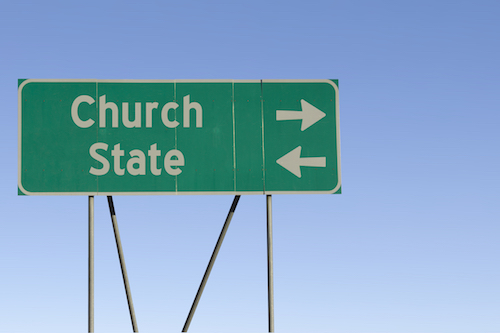
A North Carolina sheriff's office has agreed to cease its promotion of a fast-approaching prayer event after the Freedom From Religion Foundation raised constitutional objections.
FFRF recently sent a letter to the Ashe County Sheriff's Office, based in Jefferson, objecting to a "Time of Prayer" event it was scheduled to host on Saturday, June 24. Highlighting the event will be a prayer led by Anne Graham Lotz, the daughter of the celebrity evangelist Billy Graham and sister of Franklin Graham. The sheriff's office had been advertising on its official website and social media accounts, giving the appearance of government endorsement of religion.
The Ashe County Sheriff's Office informed FFRF that it has removed mention of the event from the sheriff's website and moved its location from the steps of the sheriff's office, as was advertised, to the parking lot. The sheriff's office has also said that any group can use the parking lot for events, including FFRF's local North Carolina chapter, the Triangle Freethought Society.
FFRF is asking the county to address its remaining concern: that Ashe County officers, and perhaps Sheriff Terry Buchanan, will be appearing at the event in their official uniforms, and may even speak using their government titles. This would exacerbate the appearance that the sheriff's office endorses Christianity, which is already a concern due to the history of the event.
Quoting precedent from federal circuit courts and the Supreme Court, FFRF Staff Attorney Andrew Seidel wrote to the Ashe County Sheriff's Office warning against this state and church entanglement.
"Using a government title and uniform to promote his personal religious beliefs or the beliefs of Mrs. Lotz would give the unfortunate impression that the county supports and endorses those particular religious beliefs," wrote Seidel. "This presents a problem for the sheriff because the Establishment Clause prohibits the government from 'promoting or affiliating itself with any religious doctrine or organization.'"
Approximately 30 percent of Americans do not identify with Christianity and nearly 25 percent are not religious at all. Already, this event alienates non-Christian community members by featuring a prominent evangelical speaker.
"By endorsing a Christian prayer event, law enforcement officers demonstrate that they prefer Christianity over all over faiths and risk estrangement in their relationship with non-Christian citizens," says FFRF Co-President Annie Laurie Gaylor. "The Ashe County officers should focus on their secular duties citizens trust them with."
FFRF is asking for assurances that Sheriff Buchanan and his deputies do not attend or participate in the event in their official capacity or on government time. Ashe County officers have secular duties to take care of — and organizing or attending a "Time of Prayer" is far beyond the scope of civil government.
The Freedom From Religion Foundation is a nationwide nonprofit organization, with more than 29,000 nonreligious members and chapters all over the country, including 600-plus members in North Carolina and a state chapter, the Triangle Freethought Society.
Photo via Shutterstock by Jeremy What
FFRF nixes coach-led prayers in Kansas
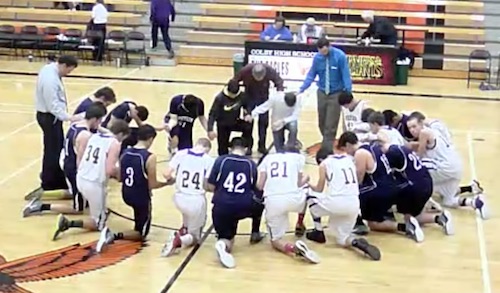
The Freedom From Religion Foundation has stopped coach-led praying in a Kansas school district.
Following a basketball game on Jan. 31, the Cheylin High School and the Weskan High School boys basketball teams joined together for a prayer at center court. Coaches from both teams reportedly participated in the prayer.
It is illegal for public school athletic coaches to lead their teams in prayer, FFRF pointed out. The U.S. Supreme Court has continually struck down school-sponsored prayer in public schools.
"Public school coaches must refrain not only from leading prayers themselves, but also from participating in students' prayers," FFRF's Patrick O'Reiley Legal Fellow Chris Line wrote to Allaire Homburg, the superintendent of Cheylin Unified School District 103 in Bird City, Kan. "It is unconstitutional for public school employees to participate in the religious activities of their students. Federal courts have held that even a public school coach's silent participation in student prayer circles is unconstitutional."
FFRF asked that the school district immediately investigate and take swift action to stop school-sponsored prayers within its athletic programs.
The school district took FFRF's objection seriously. Homburg recently responded in an email with a firm promise: "You have my assurance that this will not happen again."
FFRF welcomes the pledge.
"It's our purpose to point out constitutional violations to public officials," says FFRF Co-President Annie Laurie Gaylor. "It's especially gratifying when they respond so decisively in the right manner."
The Freedom From Religion Foundation is a national nonprofit organization with more than 29,000 members across the country, including in Kansas. Its purpose is to protect the constitutional principle of separation between state and church and to educate the public on matters relating to nontheism.
FFRF opposes N.C. sheriff prayer event
The Freedom From Religion Foundation is protesting an upcoming religious event scheduled and promoted by a North Carolina sheriff's office.
The Ashe County Sheriff's Office, based in Jefferson, is hosting a "Time of Prayer" event on Saturday, June 24, which it is promoting on both its official website and social media pages. Highlighting the event will be a prayer led by Anne Graham Lotz, the daughter of the celebrity evangelist Billy Graham and sister of Franklin Graham. The sheriff's department is also lending its symbols- a shield and seal- to advertisements for the event, which will be held on public property.
FFRF is raising serious constitutional concerns over the blatantly Christian event. Time and again, the Supreme Court has upheld that the Establishment Clause of the First Amendment mandates that government be neutral between religion and nonreligion. That means that public officials may not seek to advance or promote religion, which the actions of Ashe County do. The "Time of Prayer" event featuring a prominent evangelical speaker sends a clear message that the sheriff's office prefers religion over secularism and Christianity over all other faiths.
Around 30 percent of Americans do not identify with Christianity and nearly 25 percent are not religious at all. This event alienates non-Christian community members, which can hold serious repercussions when it comes to the relationship of these citizens with law enforcement.
"Citizens interact with and rely on law enforcement officers during some of the most urgent and vulnerable times of their life," writes FFRF Staff Attorney Andrew Seidel in a letter sent to Ashe County Sheriff Terry Buchanan. "These citizens should not be made to feel offended, excluded and like political outsiders because the local government they support with their taxes oversteps its power by organizing and promoting religious events."
FFRF is insisting that the Ashe County Sheriff's Office cease its publicizing, organizing and promoting this and other prayer events. Law enforcement officers have secular duties that citizens trust them to attend to — and organizing a "Time of Prayer" is far beyond the scope of civil government.
"It is wholly inappropriate for the sheriff's office to be so intimately involved in a patently religious event," says FFRF Co-President Annie Laurie Gaylor. "Expending public resources to support prayer and Christianity is a misuse of a government power and a reckless breach in the wall between state and church."
The Freedom From Religion Foundation is a nationwide nonprofit organization, with more than 29,000 nonreligious members and chapters all over the country, including 600-plus members in North Carolina and a state chapter, the Triangle Freethought Society.
Image by AnGeL Ministries under CC BY-SA 3.0.
FFRF wants Christian Texas courthouse sign removed
The Freedom From Religion Foundation is asking for a blatantly Christian sign to be removed from a Texas courthouse.
A concerned Orange County citizen recently contacted FFRF to report that prominently displayed in the county courthouse building is a religious sign stating "Trust In The Lord." To remove any possible ambiguity in the message, there is a cross in the middle of the sign. There is no doubt that the religious sign is meant to get the attention of the general public. Furthermore, the concerned citizen also noticed multiple crosses on display at the workspace of a courthouse official.
"The Supreme Court has long recognized that the First Amendment 'mandates governmental neutrality between religion and religion, and between religion and nonreligion,'" FFRF Staff Attorney Sam Grover writes to Orange County Tax Assessor-Collector Karen Fisher. "Displaying signs that promote Christianity, along with Latin crosses, fails to respect either constitutional mandate of neutrality. It endorses religion over nonreligion and Christianity over all other faiths."
And the religious significance of the Latin cross is unambiguous and indisputable. "The Latin cross . . . is the principal symbol of Christianity around the world, and display of the cross alone could not reasonably be taken to have any secular point," to again quote the U.S. Supreme Court.
Besides, such signs alienate the considerable portion of the population that isn't Christian. These citizens should not be made to feel excluded, like outsiders in their own community, because their county prominently places Christian signs and symbols in important buildings. Nearly 30 percent of Americans are non-Christians, with almost 25 percent practicing no religion at all.
The verse displayed in the courthouse is from Proverbs 3:5: "Trust in the Lord with all thine heart; and lean not on your own understanding." On the contrary, FFRF counsels, citizens should be watchdogs who demand government accountability and transparency.
"County residents going into the Orange County Courthouse to conduct crucial business should not perceive that they're intruders just because they don't share the sentiments displayed inside the building," says FFRF Co-President Annie Laurie Gaylor. "Such an important governmental center should be welcoming everyone."
FFRF asks that the unconstitutional religious sign and cross be removed immediately so that the right of conscience of all Orange County citizens be respected.
The Freedom From Religion Foundation is a national nonprofit organization with more than 29,000 nonreligious members across the country, including 1,200-plus in Texas. Its purpose is to protect the constitutional principle of separation between state and church.
FFRF disturbed over Ill. city council’s prayers
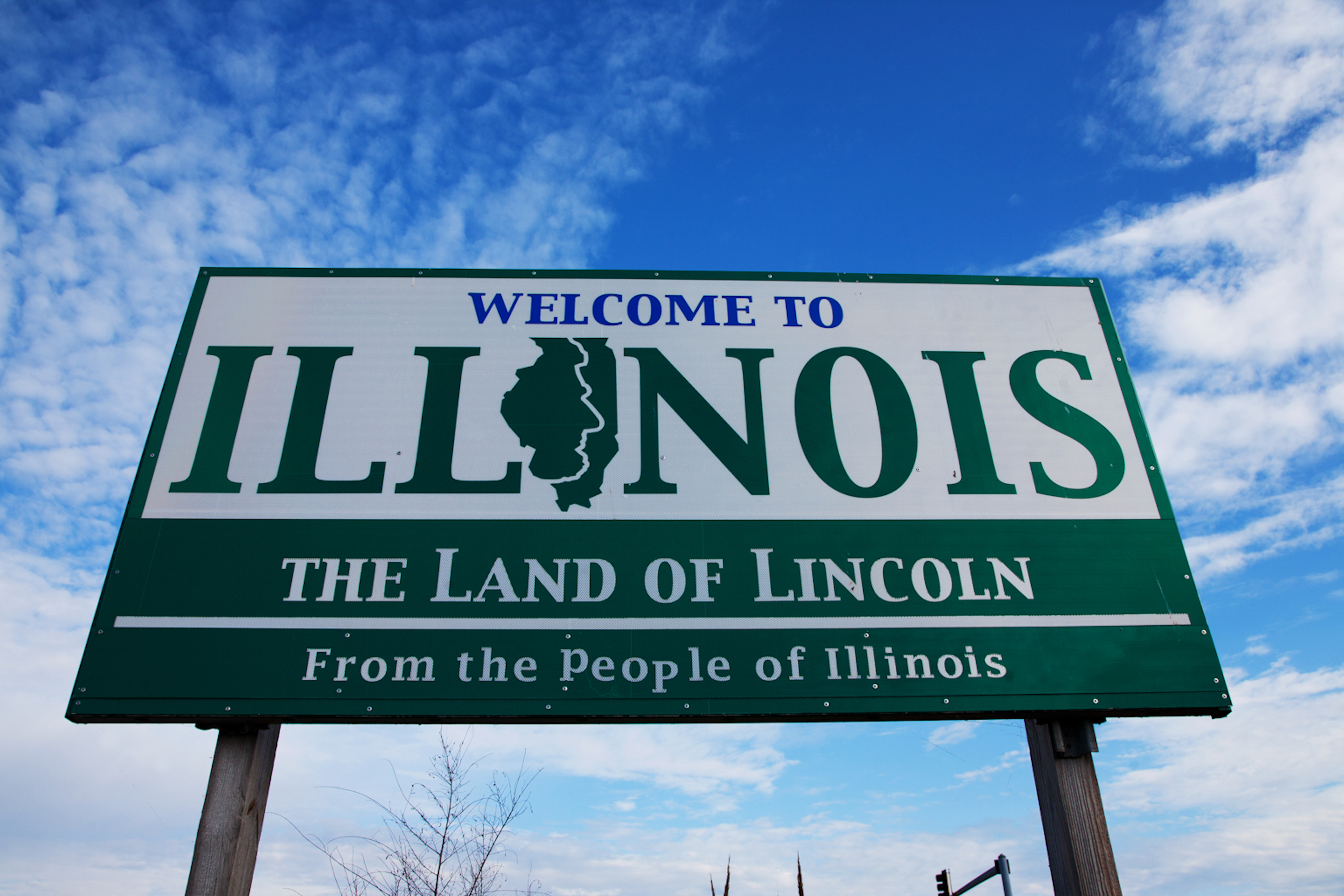 The Freedom From Religion Foundation is troubled over an Illinois city council's trend of scheduling exclusively Christian leaders to give invocations at its meetings.
The Freedom From Religion Foundation is troubled over an Illinois city council's trend of scheduling exclusively Christian leaders to give invocations at its meetings.
During a Peoria City Council meeting to install newly elected officials last month, Monsignor Stanley Deptula of the city's Catholic Diocese and Pastor Martin Johnson each led overtly sectarian prayers. Deptula opened his address with a benediction, which he explained was written by a Catholic bishop, and made reference to a "holy spirit." Johnson's invocation concluded in the name of Jesus.
FFRF raises concern over the City Council's conspicuously Christian bias evident in its prayers. There is no record of an invocation by any non-Christian speakers in the recent past. This is just the latest in the council's history of favoring parochial religious leaders to open its meetings.
"Prayer at government meetings is unnecessary, inappropriate and divisive," writes FFRF Legal Fellow Ryan Jayne to Peoria Mayor Jim Ardis. "The best solution is to discontinue invocations altogether."
A full 30 percent of Americans are not Christian, and nearly 25 percent of the public is not religious at all. It is ostracizing and intimidating for citizens who are of a minority religion or are nonreligious to attend a public meeting and be required to either make a display of their nonbelief or show deference to a religious sentiment they do not believe in.
"A local civil body ought not to lend its taxpayer-funded time to religion by inviting factional religious leaders to give prayers," says FFRF Co-President Annie Laurie Gaylor. "The City Council must either end this practice or establish a clear policy that does not discriminate against any nonreligious or minority religious citizens wishing to deliver an invocation."
This means that if the council chooses to continue its prayer practice, it must open its prayers to all attendees, including atheists, agnostics, Muslims, Wiccans or Satanists.
FFRF urges the council to demonstrate respect for the diverse scope of religious and nonreligious citizens living in Peoria by concentrating on civil matters and ending the practice of hosting prayers at meetings all together. It is in the best interest of all involved to leave religion to the private conscience of each individual.
The Freedom From Religion Foundation is a nationwide nonprofit organization, with more than 29,000 nonreligious members all over the country, including 900-plus members and chapters in Illinois and a chapter, the FFRF Metropolitan Chicago Chapter.
Minn. assemblywoman disgracefully misuses office
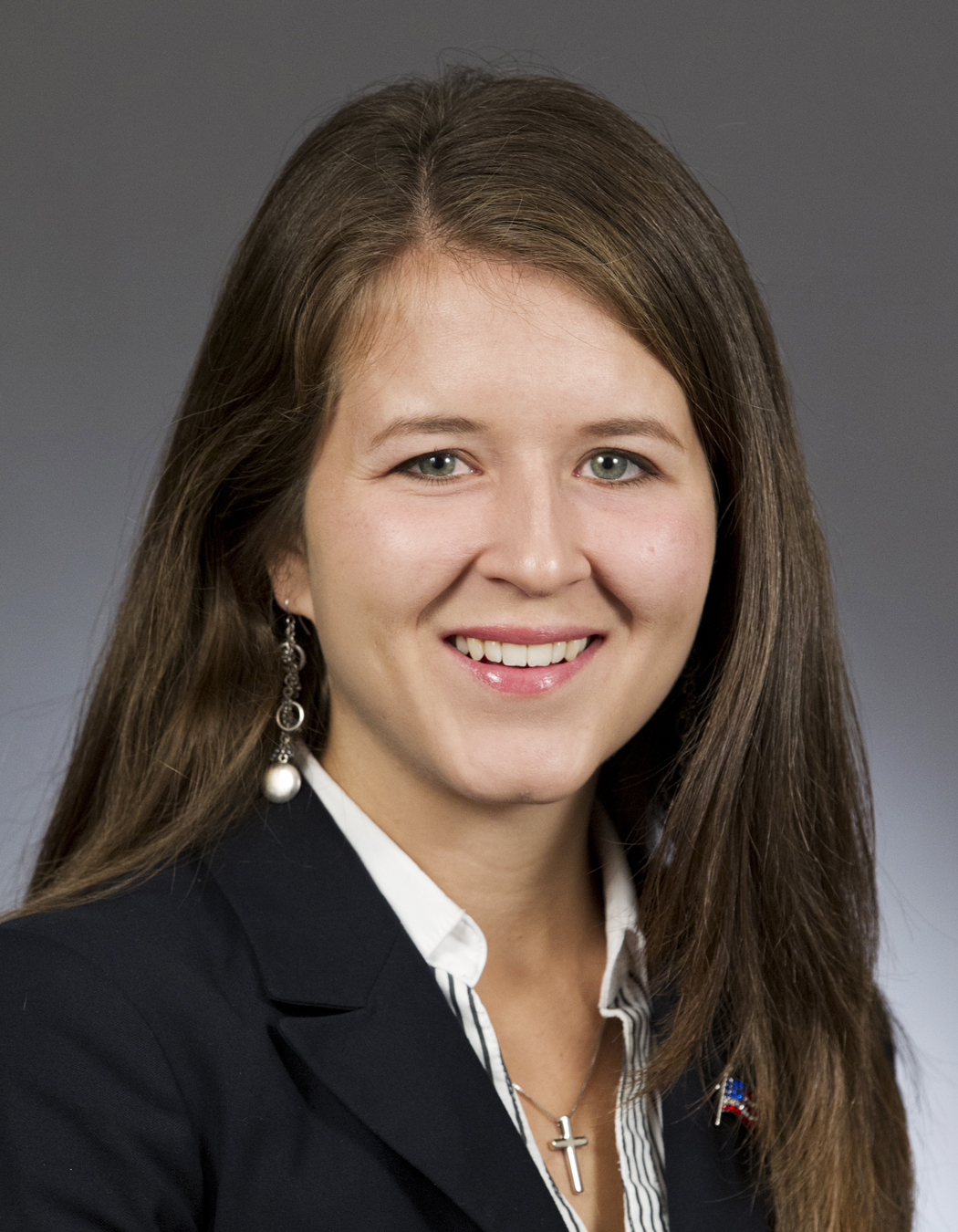 The Freedom From Religion Foundation is condemning a Minnesota state representative's outrageous misuse of her official position in preaching from the House floor.
The Freedom From Religion Foundation is condemning a Minnesota state representative's outrageous misuse of her official position in preaching from the House floor.
During a May 23 debate over whether or not to pass an amendment to an omnibus tax bill, state Rep. Abigail Whelan chose to deliver an impromptu sermon:
"I have an eternal perspective and I want to share that with you and with the people listening at home ... There is actual joy to be found in Jesus Christ. Jesus loves you all. If you would like to get to know him, [if] you're listening at home, [or] here in this room, please email me, call me. Would love to talk to you about Jesus. He is the hope of this state and of this country."
FFRF asserts that in these comments, Whelan shamelessly abused the power of her office.
"These proselytizing remarks were completely inappropriate and an egregious violation of the spirit of the constitutional principle of separation between state and church," FFRF Co-Presidents Dan Barker and Annie Laurie Gaylor write to Whelan. "The Supreme Court has held that public officials may not seek to advance or promote religion."
While Whelan is free to practice and promote her personal religious beliefs on her own time, it is inappropriate to do so through the special platform she has been afforded, FFRF emphasizes. For Whelan to use state resources to promote her personal religious beliefs on the House floor and suggest that people should convert is completely inappropriate.
Besides, Whelan is not truly representing her constituents when she makes such a blatantly sectarian appeal. More than 23 percent of Americans identify as nonreligious. That 8-point increase since 2007 and 15-point jump since 1990 makes the "Nones" the fastest growing identification in America. Nearly 30 percent of Americans are non-Christians, either practicing a minority religion or no religion at all.
Whelan took an oath to uphold our country's godless and entirely secular Constitution, FFRF reminds her. Her statement to turn everything over to a deity seems to be an admission of professional failure. FFRF's advice to pious politicians everywhere is to "get off your knees and get to work."
FFRF requests that Whelan commit in writing to uphold her constitutional duty not to promote her personal religion while acting in her official capacity.
"While Rep. Whelan is free to say as many foolish things as she likes from the Assembly floor, she should be prepared to hear criticism," says Barker.
The Freedom From Religion Foundation is a nationwide nonprofit organization that works to protect the constitutional principle of separation of church and state. It represents more than 29,000 nonreligious members nationally and has chapters all over the country, including almost 600 members and two chapters in Minnesota.
FFRF proudly underwrites Clarence Darrow statue
The Freedom From Religion Foundation, thanks to the support of its members nationwide, is proudly underwriting an impressive monument to the eminent civil libertarian who fought perhaps the most famous legal battle in U.S. history.
The statue of legendary lawyer and rationalist Clarence Darrow is to be dedicated on Friday, July 14, right in front of the site of the historic Scopes evolution trial: the Rhea County Courthouse in Dayton, Tenn.
A local statue of Darrow's legal adversary, William Jennings Bryan, given to the county by the William Jennings Bryan College, inspired talented sculptor Zenos Frudakis, FFRF and others to seek to remedy the "missing link." Darrow will soon take his rightful place adjacent to Bryan on the courthouse lawn. Darrow defended John Scopes when he was charged with teaching evolution at the 1925 "trial of the century."
Frudakis, based in Philadelphia, is creating the 7-foot bronze statue of the famed attorney, to be installed July 13 upon a 3-foot high base. Frudakis is a renowned American sculptor who has created an extensive, award-winning collection of more than 100 bronze sculptures in public and private collections. FFRF is contributing the lion's share of costs: $150,000, made possible through the generosity of its members.
The dedication will begin in front of the courthouse at 10 a.m. on Friday, July 14, and will include actor John de Lancie, who played Q in "Star Trek: The Next Generation." Andrew Kersten, author of the 2011 biography, "Clarence Darrow: American Iconoclast," will speak about Darrow and his "frenemy" relationship with Bryan. Kersten is dean of the College of Letters, Arts and Sciences at the University of Idaho-Moscow. Margaret Downey with the Freethought Society will emcee. FFRF Co-Presidents Dan Barker and Annie Laurie Gaylor will also say a few words. Barker, a professional musician, will set the tone prior to the dedication by a rendition of twenties music. The short dedication will end with Frudakis unveiling his creation.
The 2017 Scopes Trial and Festival will kick off shortly after with bluegrass music, booths and other festivities.
"We're thrilled to be working with an internationally known sculptor in making this gift, not just to Rhea County and its historic courthouse, but to posterity," says Gaylor. "This magnificent statue of Darrow will enhance Rhea County's history, and be a draw for generations to come."
FFRF is holding a Clarence Darrow Celebration on Thursday, July 13, the evening before the dedication, at The Chattanoogan Hotel, in Chattanooga, Tenn. This includes a Southern buffet, more music by Barker, socializing, speakers Frudakis and Kersten, guests of honor Nicole Jacobsen, Ro Frudakis and William Dusenberry. Fred Edwords of the American Humanist Association, which forwarded donations of several hundred dollars toward the statue, will say a few words. Pre-registration is required. Advance registration for the private event is required.
FFRF also encourages participants to join FFRF and its guests at the kickoff on July 14 of the annual Scopes Trial play, which is held in the courthouse itself. Purchase tickets here.
Click here to make a tax deductible donation to FFRF for the artistic project (use the dropdown to designate for the Darrow statue).
FFRF objects to official devout Indiana messages
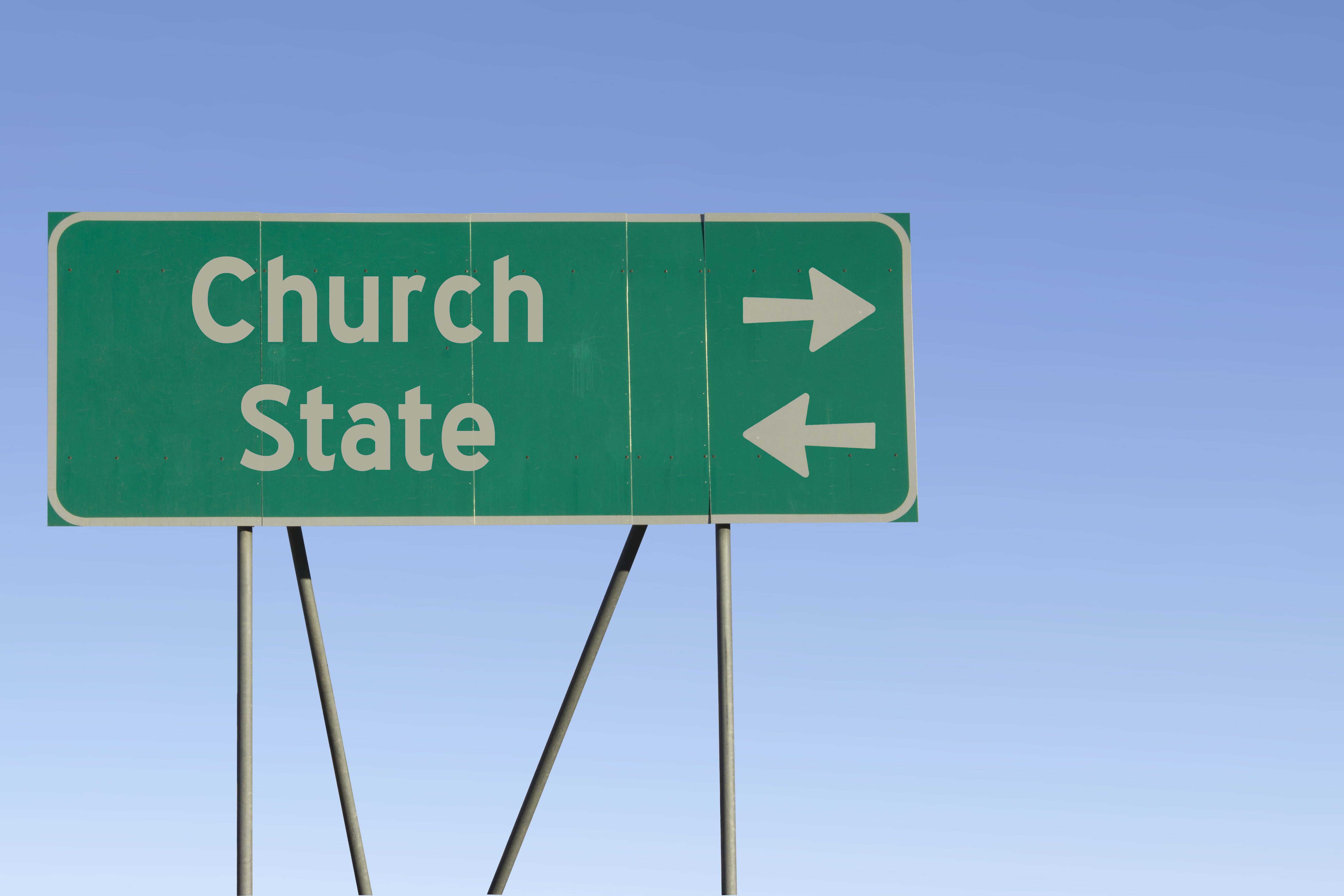
The Freedom From Religion Foundation is protesting explicitly religious correspondence that regularly originates from an Indiana government office.
A concerned local resident informed FFRF that condolence letters on behalf of "North Township Trustee Frank J. Mrvan and staff" to express sympathy for recent deaths of constituents carry an overt religious message. They state, in part:
Whereas God in His infinite wisdom has removed [the deceased] from your midst, He has not removed him from your heart. One of God's own, we celebrate his "Homecoming," where he has been given a new heavenly body that will enter into the presence of the Lord and rejoice among the angels.
The letters go on to quote from a devotional passage in the bible: "Trust in the Lord with all thine heart and lean not unto thine own understanding. In all thine ways acknowledge Him and He shall direct thy path."
The North Township Trustee office provides social services for residents of the area.
FFRF understands and appreciates that the township wants to express its respect for deceased recipients. However, FFRF points out the trustee's office can draft condolence letters that do not endorse a particular religion and are respectful of the township's duty to remain neutral on religious matters.
The U.S. Supreme Court has held that public officials may not seek to advance or promote religion, FFRF reiterates. When Mrvan corresponds on North Township letterhead, it creates the unmistakable appearance that the views expressed are made in his official capacity as trustee.
"Government officials can worship, pray, and participate in religious events in their personal capacities," FFRF Staff Attorney Andrew Seidel writes to the North Township Trustee office, based in Hammond, Ind. "But they are not permitted to use their government office to provide credibility or prestige to their religion. Their office and title belong to 'We the people,' not the office's temporary occupant."
And, as a trustee for the township, Mrvan represents a diverse population that consists not only of believers, but also atheists and agnostics. Overall, 23 percent of Americans identify as nonreligious, and another 6 percent practice non-Christian faiths. Blatantly religious condolence messages are certain to bring an unwelcome and even offensive message to many grieving households. Not all families are comforted by the thought that their loved one is rejoicing among the angels. Worse, nonreligious families are likely to receive an alternate message: that the township shares the Christian belief that nonbelievers, potentially including the deceased, are sent to hell. While these letters are unconstitutional regardless of the recipients' religious views, they are especially inappropriate in this context.
"Public officials cannot assume that their constituents share a set of religious convictions or find comfort in sectarian condolences," says FFRF Co-President Annie Laurie Gaylor. "The United States is comprised of many strands — including numerous varieties of religious and nonreligious beliefs."
FFRF asks for the North Township trustee office to stop sending out religious condolences.
The Freedom From Religion Foundation is a national nonprofit organization with more than 29,000 members across the country, including over 400 Hoosiers. Its purpose is to protect the constitutional principle of separation between state and church and to represent the views of freethinkers (atheists, agnostics, and nonbelievers).
Photo via Shutterstock
Texas Statehouse harms children with new law
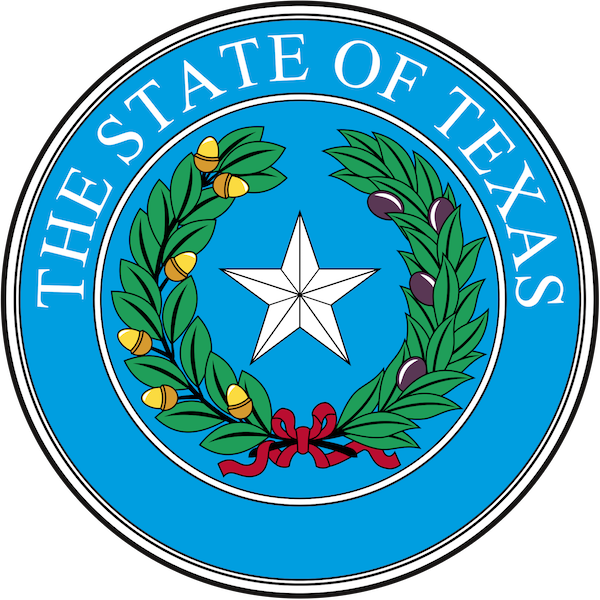 Texas has a new unnecessary and harmful law in the name of religious freedom.
Texas has a new unnecessary and harmful law in the name of religious freedom.
Both chambers of the Texas Statehouse recently approved House Bill 3859, with the Orwellian name the "Freedom to Serve Children Act," which allows child welfare providers to decline services on the basis of "the provider's sincerely held religious beliefs."
"House Bill 3859 would allow faith-based organizations to place a child in a religion-based school; deny referrals for abortion-related contraceptives, drugs or devices; and refuse to contract with other organizations that don't share their religious beliefs," reports the Texas Tribune.
Gov. Greg Abbott signed the bill into law on Thursday, June 15.
Texas has no justification for such legislation when the First Amendment has guarded our freedom of religion for so long.
"Congress shall make no law respecting an establishment of religion or prohibiting the free exercise thereof." That's our First Amendment. For years, decades, centuries, it has protected the religious freedom of Americans. The First Amendment does this by preventing the government from weighing in on religious issues, from endorsing one religion over another or even religion over nonreligion, and, most importantly, by ensuring the separation of state and church.
The Constitution is the supreme law of the land. So there is no logical reason to pass lesser state laws that claim to do something our revered Constitution already does. The question then arises as to why the Texas Legislature feels the need to put into effect a measure such as HB 3859.
The answer is simple: The true purpose of the new push for "religious freedom" is to privilege religious belief — to give religionists a license to discriminate. HB 3859 is a perfect example. It will not serve children; it will allow believers to refuse to place children in loving, caring environments.
During the legislative debate over HB 3859, a Texas state senator laid bare the actual motivation.
"It seems to me that the focus is in protecting the agency and not really concerned about the interest of the child and making sure that the child has a loving home," Sen. Sylvia Garcia said. "If we were really concerned about that, we wouldn't be concerned about protections for an agency."
FFRF agrees that the welfare of the children of Texas seems to have been far from the minds of Texas legislators who approved HB 3859.
"The Texas Statehouse has yet again pandered to the most regressive elements in society to push a discriminatory, faith-based agenda," says FFRF Co-President Annie Laurie Gaylor. "Legislators should not play (theo)political football with one of the state's most vulnerable populations."
The Freedom From Religion Foundation is a national nonprofit organization with more than 29,000 nonreligious members across the country, including 1,200-plus in Texas. Its purpose is to protect the constitutional separation between state and church.
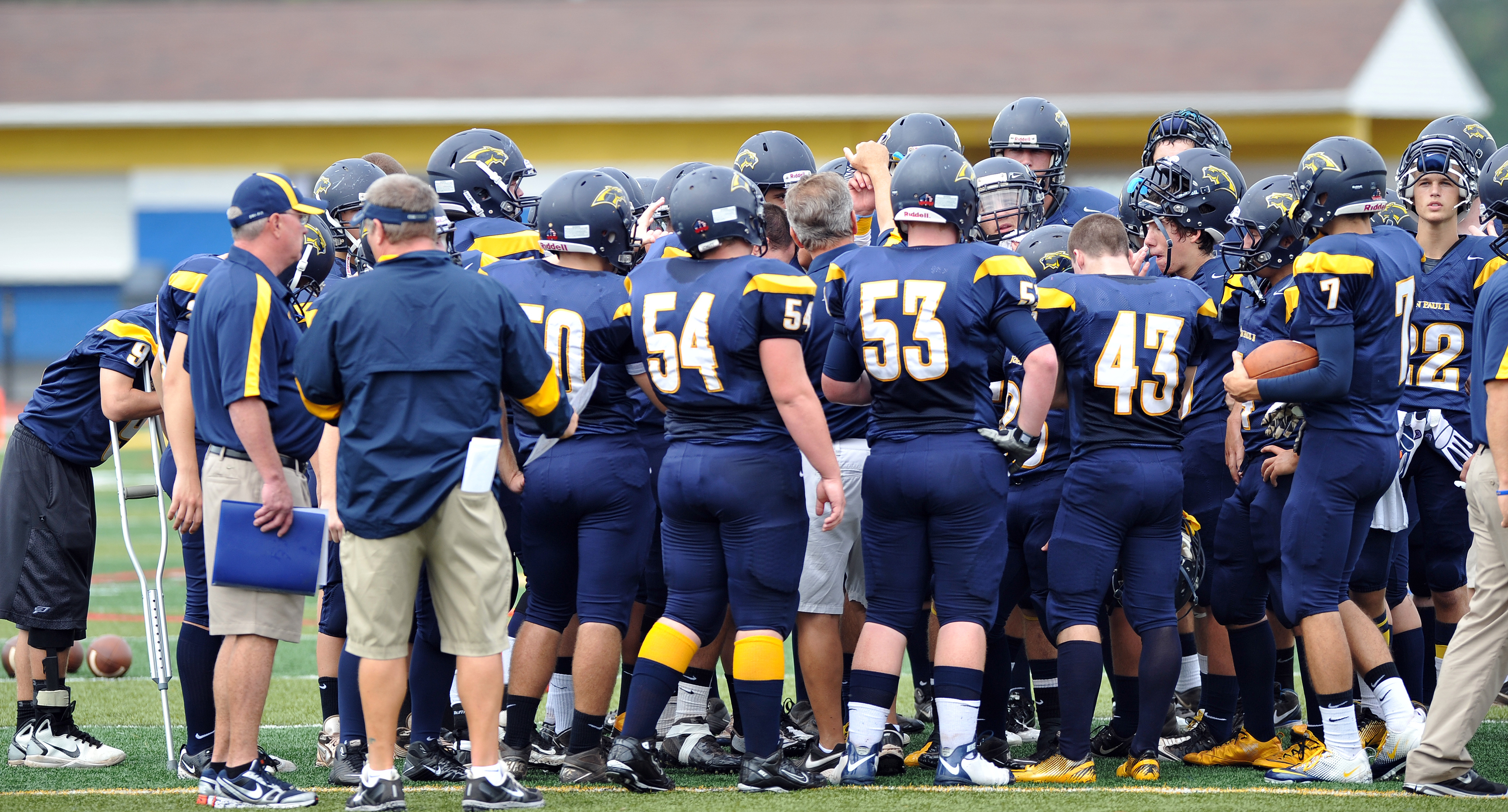
FFRF is asking that a Florida school district investigate state-church constitutional violations within its athletic program.
Three high schools in the Alachua County School District – Gainesville, Eastside and Buchholtz – are scheduled to attend a Fellowship of Christian Athletes football camp this summer. The camp includes two-a-day church services, and its stated mission is to present to coaches and athletes "the challenge and adventure of receiving Jesus Christ as Savior and Lord, serving Him in their relationships and in the fellowship of church."
The coach of Gainesville High School's team described the camp and a team activity to "emphasize faith," stating that everyone can benefit from learning Christian values. The coaching staff has also been leading the players in prayers before and after meals and games.
In a letter sent to a legal representative of the school district, FFRF warns against these blatant violations to the constitutional obligation for public schools to remain neutral regarding religion.
Public school coaches can neither lead prayers themselves nor can they participate in prayers led by students. The Supreme Court has, time and again, struck down school-sponsored prayer in public schools. It establishes a government advancement and endorsement of religion, which is a violation of the First Amendment.
Taking players to a religious camp for team training also falls under the legal breach of government endorsement of Christianity.
"Requiring or even encouraging students to attend a Christian camp sends the message of approval of the camp's religious messages to impressionable students," writes FFRF Staff Attorney Andrew Seidel. "This practice forces children, who may be of varying faiths or none at all, to enter into a Christian house of worship in order to participate in school sports."
This use of Christian camps for public school programming is especially inappropriate considering that it excludes nearly 30 percent of Americans, including approximately 45 percent of Millennials, who are not Christian. And merely allowing students to opt out of the religious events will not cure the violation. Taking the entire high school team to a camp with such an overt religious mission as part of a team-bonding activity ostracizes any student who opts not to participate.
"A student should never to chose between the participation in a public school activity and a violation of his or her personal right of conscience," says FFRF Co-President Annie Laurie Gaylor. "It is shameful that the school district is asking this of its students."
FFRF is requesting that the school district look into this situation and take immediate action to end all constitutional violations in the Alachua County School District athletic program.
The Freedom From Religion Foundation is a nationwide nonprofit organization, with more than 29,000 nonreligious members and chapters all over the country, including 1,400-plus in Florida and a chapter, the Central Florida Freethought Community.
Editorial credit: / Shutterstock.com
New Fla. law will fail its schools
Florida Gov. Rick Scott last week signed into law Senate Bill 436: the "Florida Student and School Personnel Religious Liberties Act." The Freedom From Religion Foundation has been strongly opposed to it, issuing three action alerts to its members when the legislation was pending and helping its Florida chapter provide testimony before the Statehouse. The new law is the latest of a crop purporting to do something already done by the U.S. and Florida Constitutions: protect the freedom of religion.
The U.S. Constitution protects a student's right to privately pray — and the student's right to be free from school-organized and school-imposed prayer. As the old saw goes, so long as there are math tests, there will be prayer in schools.
SB 436 goes in a disturbing direction, however, by requiring public schools to create a "forum" at all events where students speak, such as graduation ceremonies. The law encourages student speakers to pray and express their personal religious beliefs at these events. If a student does not want to be indoctrinated in another student's religion, it suggests the person "be excused" from the event. This would essentially force minority religious and nonreligious students and their families to choose between attending graduation and publicly avoiding a religious ritual with which they disagree. The Supreme Court's Weisman decision, written by Justice Anthony Kennedy, has firmly vetoed such a "choice," ruling graduation prayers unconstitutional.
The law also encourages teachers to participate "in religious activities on school grounds that are initiated by students." Staff participation in student religious expression violates the First Amendment's Establishment Clause and, in many circumstances, the federal Equal Access Act, which limits staff participation in student-run clubs to a nonparticipatory supervisory role. The new legislation will invite avoidable lawsuits, costing taxpayers and school districts dearly.
The primary sponsor of the House version, state Rep. Kimberly Daniels, has given the game away, penning a longwinded comment on her Facebook page that tries to justify the law but instead fully admits its religious purpose. She claims that "young children were not allowed to pray over their meals" in public schools, a common and thoroughly debunked persecution myth. She is also horrified that a coach was not allowed to pray with his players, something that federal courts have held the U.S. Constitution requires and which this law does nothing to change.
The new law does nothing but muddy the waters. Coaches and school staff will feel emboldened not only to illegally participate in their students' prayers but also to organize those prayers. Florida is already one of the worst offending states when it comes to state-church separation. FFRF has sent 125 letters to the state since the beginning of 2016 — about half of these to public schools that already have enough trouble keeping state and church separate.
SB 436 isn't about religious freedom; it's about imposing religion on children and bullying children of minority or no religion. It is going to get several school districts hauled into federal court. When they turn to the law for support, they'll find that state rules can't trump the federal Constitution. They'll lose — and deservedly so.
Image by Katherine Welles via Shutterstock




